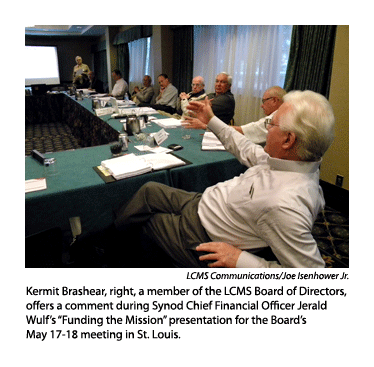By Joe Isenhower Jr.
ST. LOUIS — The Synod Board of Directors, at its May 17-18 meeting in St. Louis, adopted a national-Synod operating budget of $64,626,022 for the 2012-13 fiscal year that starts July 1.
Also approved by the Board for the upcoming fiscal year were a contingenc y surplus of $346,342, a capital-needs budget of $3,180,653 and $2,296,310 for the 2013 Synod convention budget.
y surplus of $346,342, a capital-needs budget of $3,180,653 and $2,296,310 for the 2013 Synod convention budget.
The national-Synod “mission and ministry” operating budget for the next year is some $12.1 million less than the one the Board set a year ago for the current fiscal year.
However, Synod finance officers who presented the budget emphasized that comparing the two years’ budgets is not valid, primarily because of the national-Synod restructure that was carried out within the past year.
Synod Chief Financial Officer Jerald C. Wulf and Charles Rhodes, executive director of Accounting for the Synod, made the 2012-13 budget presentation to the Board.
When added together, the 2012-13 national operating budget and surplus equal $64,972,364, which is the amount of revenue expected for the coming year.
Capital expenditures are charged back to Synod units “over the life of the asset via depreciation,” according to a slide prepared for the budget presentation. The convention budget is covered by assessments through the 35 LCMS districts.
Undesignated revenue for the coming year’s budget is projected to be down by $894,000, compared with 2011-12 revenue — including a $313,657 decrease in pledged unrestricted support from LCMS districts. This decrease in projected district support is a smaller decrease than the national office has seen over the past years.
Wulf thanked unit executives at the Synod’s International Center, the Office of the President and Chief Mission Officer (CMO) Rev. Gregory K. Williamson for “coming together in such a realistic way” to prepare the 2012-13 operating budget.
Rhodes said the new year’s budget preparation was “probably the most difficult” for the Synod Accounting office that he could recall, since new charts of accounts had to be developed and applied “to accommodate the restructure.”
“I can’t thank the Accounting staff enough,” Wulf added. He referred to the 2012-13 budget work of unit executives as “a yeoman’s task,” and credited those executives and Williamson for including figures for unit expenditures that allow for cuts of 5, 10 and 15 percent, should projected revenue fall short.
Synod President Rev. Dr. Matthew C. Harrison voiced “thanks for being conservative with revenue projections.” He said he is “thrilled with the way everyone worked so collaboratively for this budget to come together.”
Other actions
The Synod Board of Directors added its unanimous approval to the historic “affiliation agreement” between Concordia University Wisconsin, Mequon, Wis., and Concordia University, Ann Arbor, Mich.
The Board of Directors’ May 18 action was the third approval of that affiliation – after the Boards of Regents of both schools also gave their unanimous approval within the previous week.
Following that final action, Board of Directors Chairman Rev. Dr. Robert T. Kuhn “excuse[d] with thanks” an “ad hoc” audit committee of the Board that had looked into ways of helping Concordia, Ann Arbor.
“Your work is completed,” Kuhn said, as he thanked the Board members who made up that committee headed by Curtis Pohl.
(For more about the affiliation agreement of the two schools, click here.)
In other actions, the Board:
- authorized transferring supervision of fundraising activities from the LCMS Foundation to the chief mission officer, as called for in an action of the 2010 Synod convention.
- approved revisions to Board policies having to do with Synod officers serving on the Board and with legal and insurance matters.
- rescinded the hiring freeze it authorized for the corporate Synod in 2009.
- approved Concordia University Wisconsin’s request to build a 700-space parking garage, “to be paid for with [the university’s] institutional funds.”
- unanimously elected the Rev. Dr. Orville C. Walz of Bennington, Neb., to fill a clergy vacancy on the Concordia University System Board of Directors.
- elected Sue Elsholz of Birmingham, Mich., to fill a lay vacancy on the Lutheran Church Extension Fund Board of Directors.
- filled four vacancies on the Board of Directors — Concordia Plan Services and Board of Trustees — Concordia Plans. The Rev. Kory Boster of Sallisaw, Okla., was elected to fill a clergy vacancy and the following to fill lay vacancies: Philip Fluegge of Shelby Township, Mich.; Frederick G. Kragel, Henrico, Va.; and Mark Schmidtke, Valparaiso, Ind.
- appointed four Lutheran Church Extension Fund members-at-large: the Rev. Ronald R. Carnicom of Hackensack, Minn.; Michael Grosse, Gunnison, Colo.; Duane Helm, Bloomington, Minn.; and Howard Luehmann, Lewiston, Minn.
- dismissed “with thanks” a property evaluation committee made up of Board members.
A whereas of the resolution the board adopted notes that “the now-completed [national Synod] restructuring resulted in the establishment of a unified and self-contained fundraising unit (Mission Advancement) reporting directly to the chief mission officer.”
Delegates to the 2010 Synod convention adopted a resolution asking the Board to “evaluate all assets,” which the property evaluation committee has completed for the Board.
Reports
In comments to the Board as it began its meeting, Harrison said that his “watchword for today is ‘thankfulness.’ ”
He applied that watchword to the proposal for the affiliation agreement between Concordia University, Ann Arbor, and Concordia University Wisconsin.
“The result, I think, is going to be an enormous blessing for the church,” he said.
Harrison added that he also is thankful “for the budget process this year” and for the appointment of Nicole Ridley as chief executive officer of the LCMS National Housing Support Corporation. (Click here for related story.)
CFO Wulf continued his “Funding the Mission” report spanning several Board meetings, in reviewing the recommendations of the 2008 Synod Blue Ribbon Task Force For Funding the Mission.
Wulf led the Board discussion of two recommendations at the May meeting — recommendations 8 (“Support from Corporate Entities”) and 9 (“Support from RSO’s”).
Mark Hofman, executive director of Mission Advancement for the Synod, briefed the Board on Mission Advancement’s plan for raising funds, for which he said his team has two long-range goals.
The first is “to maximize the impact of every gift on [both international and national] witness and mercy efforts.
“Our work in Advancement is a constant balancing act,” he said. “Spend excessively to raise funds and we’re obviously inefficient, using resources that belong in the field. Conversely, we can underspend and be ineffective. If we’re too frugal, we risk failing to meet fundraising expectations. Either way, work in the field suffers because of insufficient resources.”
The second goal is “to treat people as investors rather than attempting to sell some program or beg money out of them.
“Best-practice fundraising is about building symmetrical relationships,” Hofman said. “We have to balance the needs of Synod with the needs of donors who want to make a difference through their offerings. Synod cannot simply be a consumer of resources. We must intentionally deliver value and benefit back to contributors, especially through improved transparency and accountability. This is essential for building trust in how offerings are used and for receiving future gifts.”
For the coming fiscal year, he said that Mission Advancement is expected to secure $24.3 million in gifts supporting prioritized witness and mercy work. He added that the team must also attempt to raise $11.9 million for the Lutheran Malaria Initiative and $600,000 for special projects, resulting in a total annual fundraising goal of $36.8 million.
Mission Advancement’s budget for the year is $5.4 million.
“Meeting all expectations within budget would reduce annual fundraising costs from 20.3 to 14.7 cents-per-dollar,” he said.
Hofman added that he is “working to build a streamlined team from personnel who had formerly been siloed within separate ministry departments.” He also said that Synod leaders would see “regular performance reports based on objective standards” and would review needed fundraising policies.
Hofman ended his report to the Board by stating that “Advancement supports our mission of taking the Gospel to every person on Earth, because nothing matters in this life except knowing Jesus.”
Posted May 25, 2012 / Updated May 29, 2012



